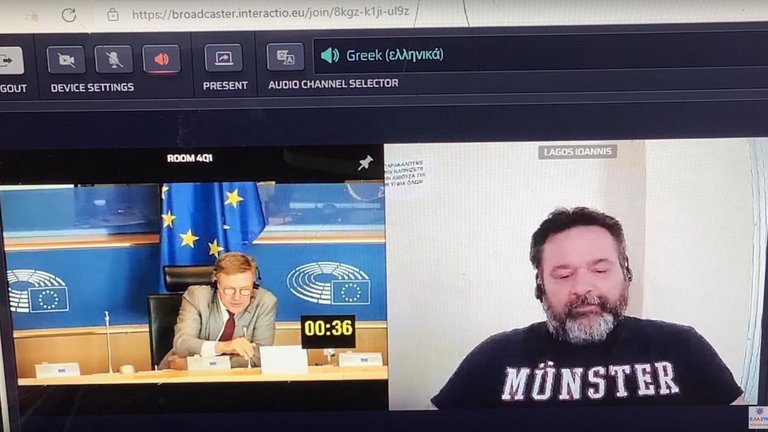We Are Suing The EU Parliament Over Greek Nazi Criminal Who Is Both In Prison And In Parliament
Ioannis Lagos is a convicted nazi serving jail sentence in Greece. He is also a Member of the European Parliament. We want to know what Lagos has been using Parliament funds for, but the Parliament refuses to disclose this in order to “protect his data”. So we are taking them to court.

Screenshot
In October 2020, a landmark ruling in Greece declared Golden Dawn, the Greek neo-nazi party, a criminal organisation. Golden Dawn was dissolved and its leaders were sentenced to jail; an important and joyful victory in the fight against fascism that was celebrated in Greece and all around Europe.
Among those receiving a jail sentence of over 13 years was Member of the European Parliament (MEP) Ioannis Lagos, the only Golden Dawn member with a seat in the EU Parliament. Lagos was found guilty of running the criminal organisation that was Golden Dawn, as well as orchestrating the stabbing of anti-fascist rapper Pavlos Fyssas and other violent attacks.
Yet in spite of his criminal conviction and even to date, Lagos not only remained an MEP but in fact never ceased to have access to the public funds MEPs and their assistants are entitled to. Over € 100,000 have been made at his disposal to date; an opportunity Lagos has been openly keen on: “Despite being in prison illegally, I decided to claim everything I was entitled to as an elected MEP and to carry out my duties as much as possible,” he has stated.
More than 100,000 € for Nazi MEP
Lagos was extradited to Greece and entered prison in May 2021, but for the many months prior to that since the moment of his conviction, he was to roam and operate freely around Brussels. This is due to the fact that it took the European Parliament over 7 months to lift Lagos’ parliamentary immunity, which shielded him from being extradited. During this period, Lagos also openly stated he was making arrangements to seek asylum elsewhere in Europe - likely in Norway - in order to escape his jail conviction.
His access to and use of public funds therefore raises important questions. What has Lagos been using these funds for? Was public money used to perpetuate criminal activity? Or to arrange an escape from a criminal conviction?
Only the European Parliament can answer these questions. The Parliament is, however, refusing to make this information public in order to protect Lagos’ “personal data”. So we have filed a lawsuit before the General Court of the EU, where we will fight for disclosure.
Democratic flaws become a liability under far-right expansion
Ioannis Lagos is, evidently, no ordinary MEP – and yet in many ways he is. Even as a convicted neo-nazi serving a jail sentence for criminal activity, Lagos is still allowed to receive and use public funds in order to carry on his activity. This alone should be considered alarming and unacceptable, let alone the fact that the use of these funds is not being made transparent.
Lagos’ case is certainly an extreme one, but it should also be seen as a direct consequence of a legal framework that was flawed from the very start, inevitably making it vulnerable to abuse. To date, the European Parliament has failed to address the severe accountability blackhole around MEPs allowances, allowing for the use of public funds by publicly-elected representatives to become untransparent and unaccounted for, as a rule.
Yet with far-right forces on the rise in many EU countries, loopholes such as this one are set to become an increasingly problematic situation. The 2019 European Parliament elections saw a record number of far-right representatives being elected. This increase, along with many other advances at the national level, should have served as a warning sign and have triggered immediate action: whatever accountability gaps exist in public institutions are becoming liable to be exploited by undemocratic actors, and must therefore be closed before it’s too late.
Before Lagos, the fact that public representatives could make use of public funds with no accountability whatsoever was already unacceptable. Now, with far-right parties increasingly making their way into democratic institutions, making transparency and accountability the rule has become an imposition and a matter of urgency.
The use of public funds, considered “personal data”
On top of their salary, throughout and after their term, MEPs have at their disposal a series of parliamentary (public) funds called “allowances”. These allowances can be used to cover travel expenses, accommodation, medical costs, the use of official vehicles, meals, office rent, telephone bills… MEPs also receive an allowance for every day they clock in at the office, i.e: for simply showing up for work. The total amount of allowances each MEP has at their disposal is over € 5,000 per month.
Very little control and no accountability exists over how MEPs and their assistants use these funds. For a part of these allowances (the so-called “General Expenditure Allowance”) MEPs have the option of proactively publishing how much money they’re claiming and what they are using it for. However, this provision being voluntary means that only a small percentage of MEPs publish this information, with levels of detail varying greatly.
Meanwhile, for other allowances besides the General Expenditure one, there is not even a voluntary provision to make them transparent. The only resort to find out more about the use of these funds is the EU freedom of information law, used to file a request to the European Parliament.
The Parliament, however, has repeatedly refused to disclose any information at all, alleging the use of these funds and MEPs’ expenses is “personal data”. This was also the case when we requested all expenses filed by Ioannis Lagos from the date of his conviction until his immunity was lifted. During this period, Lagos filed numerous expenses claims; not a single one was released by the Parliament, which claims not to see the public interest in making this information transparent. The General Court of the EU will now have to rule whether this is in fact lawful.

Is there something you’d like to share?
At FragDenStaat, we treat documents with care. Here's how you can share them with us confidentially.
This article is available in other languages.
